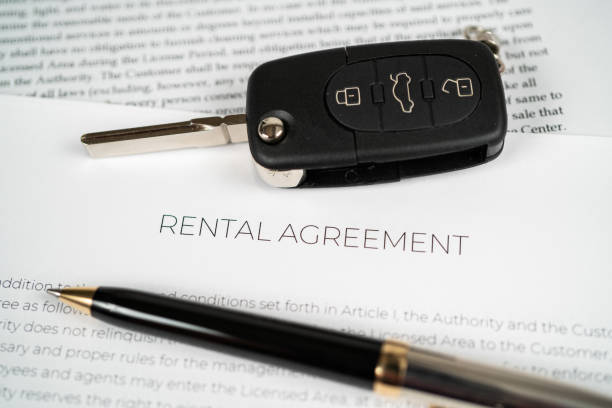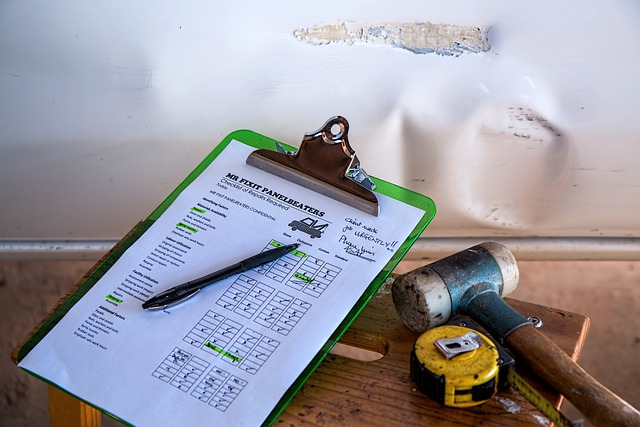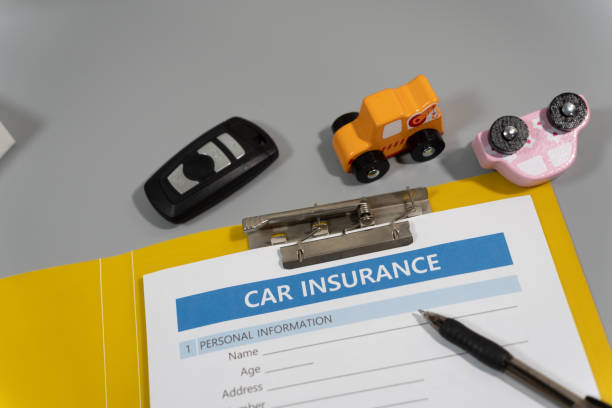As a landlord, managing rental properties often involves more than just collecting rent checks and handling tenant complaints. You may find yourself frequently traveling to properties for inspections, meeting contractors, or attending tenant meetings. In all these cases, you may wonder: Do I need business use car insurance for traveling to my properties?
The short answer is yes, but the question is more nuanced. The type of insurance you need depends on how often you use your vehicle for property management tasks and the extent of business use involved. Business vehicle insurance ensures that you’re covered while driving for work-related activities, protecting both you and your assets.
This comprehensive guide will delve into the different aspects of car insurance for landlords, exploring when business use car insurance is necessary, what types of coverage are available, and the potential costs and benefits.
What Is Business Use Car Insurance?
Before we dive into the details, it’s crucial to first understand what business use car insurance is and how it differs from regular auto insurance.
Business use car insurance is a specialized type of insurance that covers vehicles primarily used for business purposes. While personal auto insurance typically covers your vehicle for everyday use, it may not provide the necessary coverage when you use your vehicle for business activities.
For landlords, business use car insurance provides protection when driving to rental properties, transporting tools and materials, meeting tenants, or performing property inspections. It offers liability protection and can also cover physical damage, medical expenses, and other business-related incidents that might occur during your trips.
Personal Auto Insurance vs. Business Insurance
The main difference between personal auto insurance and business vehicle insurance is the coverage provided. Personal auto insurance is designed to cover everyday, personal driving—such as commuting to work, running errands, or going on road trips.
However, when you start using your vehicle for business purposes, personal auto insurance may not offer adequate protection. If you are involved in an accident while conducting business activities, your insurance may not cover the costs associated with property damage, medical expenses, or legal liabilities.
Business vehicle insurance, on the other hand, is tailored to protect vehicles used for business purposes. If you’re traveling to inspect your properties, meet tenants, or transport materials, this type of insurance will ensure you are covered in case of an accident.
The Need for Business Use Car Insurance
As a landlord, your car is likely used for tasks beyond personal commuting. You may need to travel to your rental properties for inspections, repairs, or to meet with contractors. In these cases, business car insurance for property owners becomes an essential form of protection.
When Do Landlords Need Business Use Car Insurance?

Landlords need to assess the frequency and nature of their business-related driving to determine if business car insurance is required. If you are using your personal vehicle for any of the following activities, business car insurance could be necessary:
1. Traveling to Properties for Inspections or Repairs
Regularly traveling to rental properties for inspections or repairs is a common task for landlords. Whether you are checking on the condition of a property, ensuring that tenants are following the lease terms, or coordinating repairs with contractors, these activities require travel.
Business use car insurance is needed because it covers any potential damage or accidents that might occur while you’re driving for work. Since your vehicle is no longer being used for personal commuting, your personal auto insurance may not cover incidents that happen while driving for business-related purposes.
2. Transporting Tools or Materials for Property Maintenance
Landlords often need to transport materials, tools, or equipment to their properties for maintenance work. Whether you’re delivering supplies to fix plumbing issues, carrying construction tools for repairs, or transporting furniture for a rental property, your vehicle is being used for business activities.
Business vehicle insurance can help cover any damages or injuries that might occur during these trips. It ensures that both the vehicle and the materials inside are covered.
3. Meeting Tenants or Contractors
Many landlords need to meet with tenants to discuss issues with the property, address complaints, or perform regular check-ups. Additionally, you may need to meet with contractors for property maintenance, repairs, or upgrades. Driving to these meetings is a regular part of property management.
Business use car insurance ensures that you’re covered when you’re on the road for these business purposes. Whether it’s a formal meeting with a tenant or an informal meeting with a contractor, your car insurance will provide coverage for these business-related trips.
4. Conducting Property Showings
If you’re trying to rent out a property, you’ll need to show the property to prospective tenants. This often requires travel to the property, and business insurance for property owners can protect you if you’re involved in an accident while showing a rental.
Types of Business Use Car Insurance for Landlords

When it comes to business use car insurance, landlords have several options depending on their needs and the level of business activity they engage in. Let’s take a look at some of the most common types of business vehicle insurance policies available for landlords.
1. Commercial Auto Coverage
Commercial auto insurance is designed for vehicles used primarily for business purposes. If you’re using a vehicle for property management tasks on a regular basis, such as traveling to rental properties, transporting equipment, or meeting with contractors, commercial auto coverage is essential.
This type of coverage provides protection against property damage, liability claims, and medical expenses in the event of an accident. It is also ideal for landlords who own a commercial vehicle (e.g., a van or truck) for property maintenance.
2. Landlord Car Insurance
If you primarily use your personal vehicle for property management tasks, you can opt for a landlord car insurance policy. This specialized insurance provides coverage for landlords who use their personal vehicles for business-related purposes, such as inspections, repairs, or tenant meetings.
While this policy is similar to regular personal car insurance, it adds specific coverage for activities related to property management. It also ensures that you’re covered in case of accidents while driving to or from rental properties.
3. Hired Auto Insurance
Hired auto insurance covers you if you rent a vehicle for business use. For example, if you don’t own a commercial vehicle or prefer to rent a car for property management purposes, this insurance ensures that you’re covered while driving a rented vehicle. This is useful for landlords who occasionally need to rent cars for inspections or when their personal vehicle is unavailable.
4. Non-owned Vehicle Insurance
Non-owned vehicle insurance provides coverage for vehicles that you don’t own but use for business purposes. For instance, if you’re driving a contractor’s or employee’s vehicle for property management tasks, this insurance will protect you in case of an accident or damage. Non-owned vehicle insurance is often bundled with hired auto insurance for comprehensive protection.
Benefits of Business Use Car Insurance for Landlords

There are several key benefits to purchasing business use car insurance for your property management activities:
1. Liability Protection
One of the primary benefits of business use car insurance is liability protection. If you’re involved in an accident while driving for property-related business, this insurance helps cover the costs of property damage, medical expenses, and legal fees. Without this coverage, you could be personally liable for the damages and could face significant financial hardship.
2. Tax Deductions for Business Use Mileage
Landlords who use their vehicles for business activities can benefit from tax deductions. The IRS allows you to deduct mileage driven for property inspections, repairs, and meetings. With the right business use car insurance policy, you can track your business mileage and claim deductions for trips related to property management.
The two main methods for claiming mileage deductions are:
- Standard Mileage Rate Deduction: This allows you to deduct a set amount per mile driven for business purposes.
- Actual Expense Method: With this method, you deduct a portion of the vehicle’s actual expenses, such as fuel, maintenance, insurance, and depreciation, based on the percentage of business use.
3. Comprehensive Coverage for Property Maintenance
Business use car insurance ensures that your vehicle is covered for more than just driving. It provides protection for transporting materials and tools used for property maintenance, repairs, or upgrades. If you’re involved in an accident while transporting property maintenance equipment, your insurance will cover both the vehicle and the materials inside.
4. Peace of Mind
Knowing that you have the right insurance coverage for your business-related driving activities provides peace of mind. You can focus on managing your properties, meeting with tenants, and completing maintenance tasks without worrying about the financial risks associated with accidents or injuries.
Costs of Business Use Car Insurance for Landlords
The cost of business use car insurance can vary depending on several factors. Understanding these factors can help you budget for the coverage you need.
1. Vehicle Type
The type of vehicle you drive plays a significant role in determining the cost of your insurance. Commercial vehicles such as trucks and vans typically have higher premiums than personal vehicles, as they are used for more intensive business activities. On the other hand, if you’re using a standard car for property management, the premiums will be lower.
2. Location
Insurance premiums also vary by location. If you’re based in a high-traffic area with a higher risk of accidents, your premiums may be higher. Additionally, if your rental properties are spread across multiple locations, the cost may increase due to the increased mileage and travel time.
3. Coverage Levels
The more extensive your coverage, the higher the premium. Liability coverage protects you in case of accidents, while physical damage coverage ensures that your vehicle is protected against damage. If you’re transporting valuable tools or materials, you may want to add specific coverage for those items.
4. Driving History
Your driving history, including any prior accidents or claims, can impact your insurance premiums. A clean driving record can help lower your costs, while a history of accidents may result in higher premiums.
Conclusion
As a landlord, business use car insurance can be a wise investment to protect yourself, your vehicle, and your property management business. Whether you’re traveling to rental properties for inspections, meeting with tenants, or transporting maintenance supplies, the right insurance coverage ensures that you’re protected in case of accidents or damages.
Business vehicle insurance provides liability protection, tax benefits, and peace of mind while managing your properties. Be sure to assess your driving habits and the type of coverage you need to ensure that you’re adequately protected. By investing in the right car insurance policy, you can focus on your property management tasks without worrying about potential risks on the road.
FAQs
1. Do landlords need business use car insurance?
Yes, landlords who use their personal vehicles for property management tasks, such as traveling to rental properties, inspecting them, or meeting with contractors and tenants, should consider business use car insurance. This insurance ensures that they are covered for accidents or damages during business-related trips.
2. How is business use car insurance different from personal auto insurance?
Personal auto insurance covers driving for personal purposes, like commuting to work or running errands. Business use car insurance, on the other hand, covers driving for business-related activities, such as property inspections, transporting tools, or meeting tenants. Personal auto insurance may not cover accidents during business-related driving.
3. Can I use my personal car for property management?
Yes, you can use your personal car for property management tasks. However, if you’re using your vehicle regularly for business purposes, you may need to adjust your insurance policy to include business use coverage. This ensures you’re properly protected while conducting property-related activities.
4. What types of business vehicle insurance are available for landlords?
Landlords can opt for commercial auto coverage, landlord car insurance, hired auto insurance, or non-owned vehicle insurance, depending on how frequently and extensively they use their vehicles for property management tasks. These policies provide liability protection, physical damage coverage, and peace of mind during business trips.
5. Is commercial auto insurance the same as business use car insurance?
Commercial auto insurance is one type of business use car insurance. It provides coverage for vehicles primarily used for business activities. Landlords can choose this option if they have a commercial vehicle, like a van or truck, for property maintenance, or if they use a personal vehicle regularly for property-related business.
6. What does business use car insurance cover?
Business use car insurance generally covers liability for property damage and bodily injuries, medical expenses, physical damage to your vehicle, and other related expenses incurred during business-related driving. It may also cover the transport of materials or tools used for property maintenance or repairs.
7. Can I deduct mileage for property management trips?
Yes, landlords can deduct mileage related to property management activities. If you use your vehicle for business purposes—such as traveling to rental properties, meeting tenants, or transporting materials—you can deduct the mileage on your taxes. Make sure to track your mileage and use the IRS’s standard mileage rate or the actual expense method.
8. How much does business use car insurance cost for landlords?
The cost of business use car insurance depends on factors like the type of vehicle, location, coverage levels, and your driving history. Commercial vehicles may have higher premiums due to the nature of the work involved. It’s important to get quotes from different insurers to find the best rates for your situation.
9. Do I need business car insurance if I only drive to properties occasionally?
If you occasionally drive to properties or meet contractors, your personal auto insurance may be sufficient, but if you are consistently using your car for property management activities, you should consider getting business use car insurance. This ensures that you’re covered during business-related trips.
10. Can I rent a car for business use and be covered under my insurance?
Yes, you can rent a car for business use and get coverage under your business use car insurance, particularly if you have hired auto insurance. This type of insurance ensures that you’re protected while driving a rental vehicle for property management tasks, such as inspections or meetings with tenants.
Also Read More Article : Is Car Windows Single Pane Glass?
